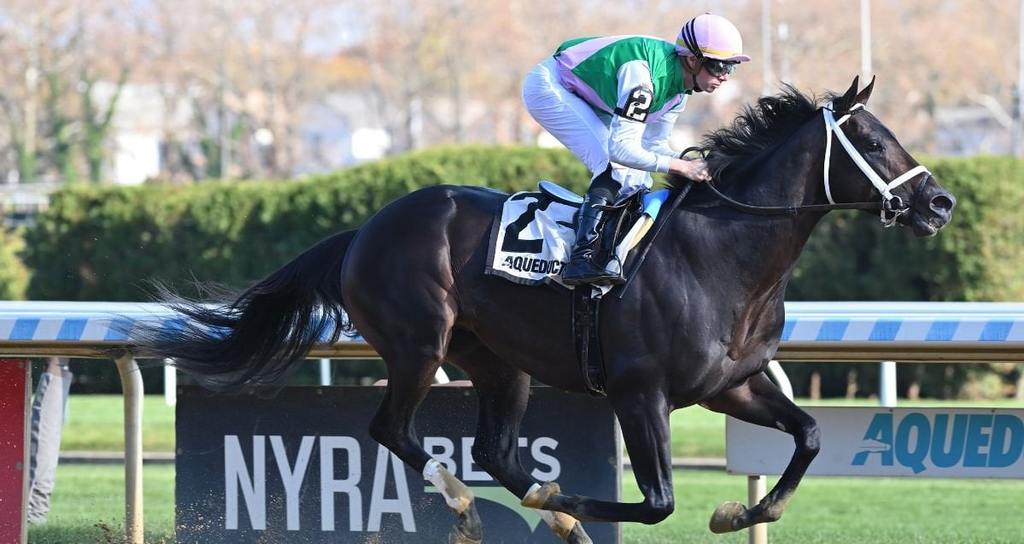
You want a horses full potential, take your time
Everybody talks about patience in horse racing, but few actually have it. Everyone likes to say, “We’ll give the horse time.” But when stall rent, vet bills, and owner expectations pile up, talk gets cheap and reality gets expensive.
Patience costs money. It’s easy to wait when you can afford to. It’s a whole different ballgame when every start means survival. That’s why the best barns — the deep ones with financial backing — can develop horses the right way. They’re not forced to run for the sake of running. They wait for the horse to tell them when it’s time.
Last weekend reminded us how powerful that approach can be.
Disco Time — The Brad Cox Blueprint
Brad Cox doesn’t chase races. He trains toward them. With Disco Time, who returned from a significant layoff to win a prep and followed that with the Dwyer Stakes, Cox showed the value of patience in living color.
He could’ve tried to bring the horse back sooner. He didn’t. He waited until Disco Time was physically and mentally ready. When the colt finally reappeared, he looked like a horse who’d been managed — not manhandled. Fit, strong, composed, and confident. That’s the result of having a plan, and sticking to it, no matter what the calendar or critics say.
Cox trains like a man who knows he’ll be around for the next big race. That’s the mindset of a barn built to play the long game.
Fully Subscribed — The Chad Brown Way
Then there’s Fully Subscribed, who captured the Mother Goose Stakes like a filly that finally got it all together. Three-year-old fillies are notoriously inconsistent, and most outfits don’t have the luxury of letting one find her rhythm halfway through the year. But Chad Brown and his team do.
They watched her develop slowly, took the lumps, and let her come around. When they led her over for the Mother Goose, you could see it: she’d matured. She stalked, pounced, and finished like a filly that finally knew who she was.
That doesn’t happen by accident. It happens when a trainer isn’t under the gun to run before the horse is ready. Brown’s operation runs on horsemanship, structure, and patience. You can’t buy that in a sale ring, but it sure helps when you have owners who understand its value.
Forego and the Timeless Value of Waiting
Patience isn’t new. The great Forego was a walking, thundering example of what time and trust can produce. He didn’t even make his debut until late in his two-year-old season, and didn’t really become Forego until he was five. few even remember he ran in Secretariat’s Kentucky Derby. Nine out of ten will immediately say Sham was the second best horse in that race. I say “hmmmmm”.
He was gangly, awkward, and plagued by minor physical issues early on. Many barns would’ve given up on him or rushed him into the wrong spots. But his people waited. They gave him time to grow into his massive frame and to understand what racing was about. The result? A four-time Horse of the Year, a legend who could carry 130 pounds like a picnic basket and run down anything in front of him.
That’s patience rewarded. That’s horsemanship.
And he’s not alone. Horses like Gun Runner, Cigar, and even Wise Dan improved dramatically with time and maturity — proof that development curves are real, and sometimes brilliance just takes a little longer to surface.
The Uncomfortable Truth
The truth nobody wants to say out loud: patience is easier to preach when you have deep pockets. The “richer barns” can let a horse sit 90 days on the farm, then another 60 galloping, and another month breezing into condition. They can afford to wait for a colt’s knees to close or a filly’s mind to catch up to her body.
A smaller barn? They don’t always get that luxury. Sometimes they’ve got to run a horse before it’s ready just to keep an owner happy or to keep the lights on. That doesn’t mean they don’t have horsemanship — it means the business doesn’t always let them use it.
Still, the best trainers — the real horsemen — know that the clock is not their enemy. The stopwatch lies more often than the horse does. And the horse will always tell you when it’s time.
Doing Nothing Can Be the Best Move You Make
In this sport, there’s always pressure to do something. Enter. Breeze. Run. But last weekend reminded us that sometimes the smartest thing a trainer can do is nothing.
Wait. Let the horse develop. Let time do what time does best.
Because when patience meets preparation, you get horses like Disco Time and Fully Subscribed — sound, confident, and winning when it matters most.
And when you think back to the greats — Forego, Gun Runner, Wise Dan — they all had something in common: somebody who waited. Somebody who didn’t force greatness, but let it happen.
In horse racing, like in life, the hardest part of patience isn’t the waiting. It’s believing the wait will be worth it. The best horsemen believe. And more often than not, they’re right.
Today’s game is win early, win now and that is reflected as early as the baby sales, but the road to the best horse you can have may just be the raod less traveled.
Past the Wire — Horse Racing Uncensored and Unfiltered, Dissected and Delivered
Nobody Does It Better.




